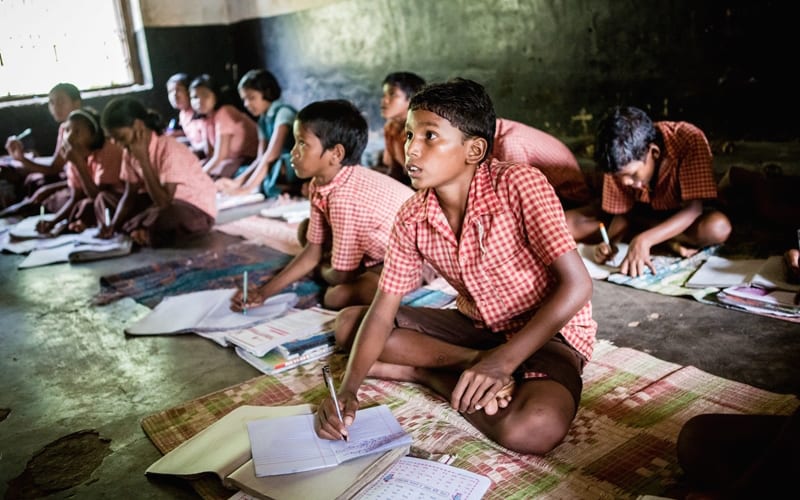THE United Nations recently claimed an 8% increase in global school enrolment – up from 83% to 91% – thanks to its Millennium Development Goal for primary education.
 Yet it is estimated that 124 million children still don’t go to school, while 757 million adults are illiterate.
Yet it is estimated that 124 million children still don’t go to school, while 757 million adults are illiterate.
That’s nearly one billion people without a proper education – the proven foundation for alleviating poverty and promoting sustainable economic progress, healthier lifestyle and enhanced social development.
The international community continues to fail the global poor by denying access to legitimate education programmes that would allow them to conquer poverty.
But if education is the cure for poverty, how do we make the antidote? That question still needs answers.
While the UN’s MDG made progress, overall it was ineffective. It focused on the quantity of children attending classes, rather than the quality of education.
A UNESCO report highlighted substandard education as the reason over 29 million children drop out of school in Sub-Saharan Africa each year. In most cases, class sizes are too big and teachers are unpaid or inexperienced.
Meanwhile, uneducated parents are more focused on the family’s short-term needs, pulling their children out of school to work and neglecting the long-term benefits of education. As they didn’t go to school themselves they don’t see the benefits for their children, so the cycle of poverty persists.
Outdated or irrelevant curricula that fail to teach students the essential skills for success where they live is another problem. Plus, many children do not receive the nutrition required for learning because schools lack funding for food programmes, even though they would incentivise parents to enrol their children.
In September 2015, the UN announced that one of its new Sustainable Development Goals would be improving the ‘quality’ of global education. It is more broadly focused on all levels of education and aims to eliminate gender and wealth inequalities.
It will require increased investment in infrastructure, teacher training, curriculum development, classroom materials, technology, food programmes and lower schools fees. Most
importantly, it must focus on learning, not just attendance.
No universal education model will work for every country. It must be adapted to local dynamics. National governments should give local leaders, parents and teachers greater educational autonomy in setting the curriculum in their region to match available jobs.
Palawan, voted the most beautiful island in the world, is also one of The Philippines’ poorest regions where education should focus on tourism skill sets, such as languages. Mineral rich countries like Peru or the Democratic Republic of the Congo should put more value on developing better math, science or geography programmes that can produce engineers or geologists (one of Peru’s highest-paid professions).
A number of private innovations are already advancing global education:
- One Laptop per Child develops and distributes millions of durable, economical, low-powered laptops, allowing rural children to access updated textbooks, classes and information.
- Internet access in isolated areas is also being solved with Google holding company Alphabet’s Loon project which provides wi-fi via balloons in the sky. India is attempting a similar project to combat low internet usage and promote education.
- Bangladesh-based NGO BRAC is providing quality primary education to the poor with a dropout out rate of less than 5%. It also runs a thriving adult education programme to prepare women for the business world.
- Bridge International’s low-cost model for building nurseries and primary schools in East Africa won The Economist’s 2015 Innovation Award.
Corruption and ignorance about the value of education means that in many countries, governments are allocating more money to defence.
Shockingly, only two percent of yearly international global aid to developing countries is spent on education. Developed countries must put stricter conditions on aid to ensure it is invested effectively.
While not the only way to achieve sustainable human and economic development, education is undoubtedly the foundation for true progress.
South Korea is a good example. A dirt-poor country with a horrendous education system during the 1960s, it has been transformed into an economic powerhouse thanks to one of the best education systems in the world.
With increased investment and advances in technology, we have a great opportunity to give the world’s poor a quality education – and with it, the tools to alleviate poverty.
• Brad L. Brasseur is a Canadian international development specialist who has travelled to over 80 countries in the world, while working in several NGOs, including extended time on education programmes in Peru and Ukraine. You can follow him on twitter at: @brbrasseur












That’s not true. South Korea had always a rather good education system (backed by the Japanese invadors and later by ecclesiastical institutions) and a willing population to use learning as a tool for development and prosperity. Without this attitude, South Korea would not have been able to send in 1969 20,000 well trained nurses to Germany and to the US as well as thousands of well trained engineers to Saudi Arabia, Lybia, Algeria and the Gulf states where they erected airports, streets, bridges, pipelines and entire cities. From the money that those people sent to South Korea, former South Korean military dictator Park Jung-Hee developed South Korea from a dirt-poor country to a industry giant and member of the G20 states.